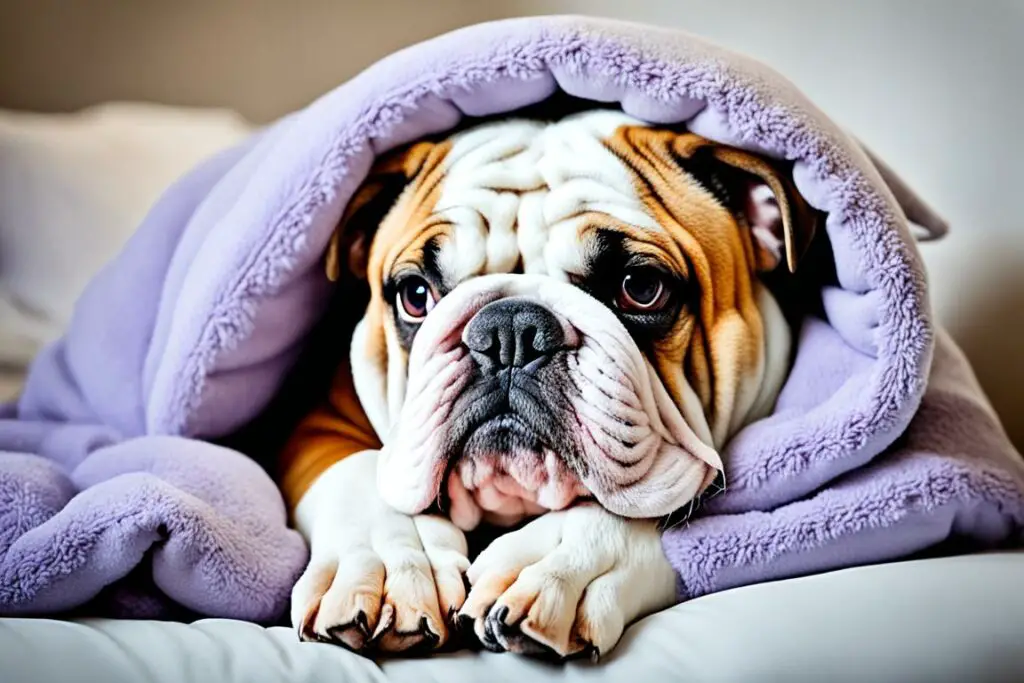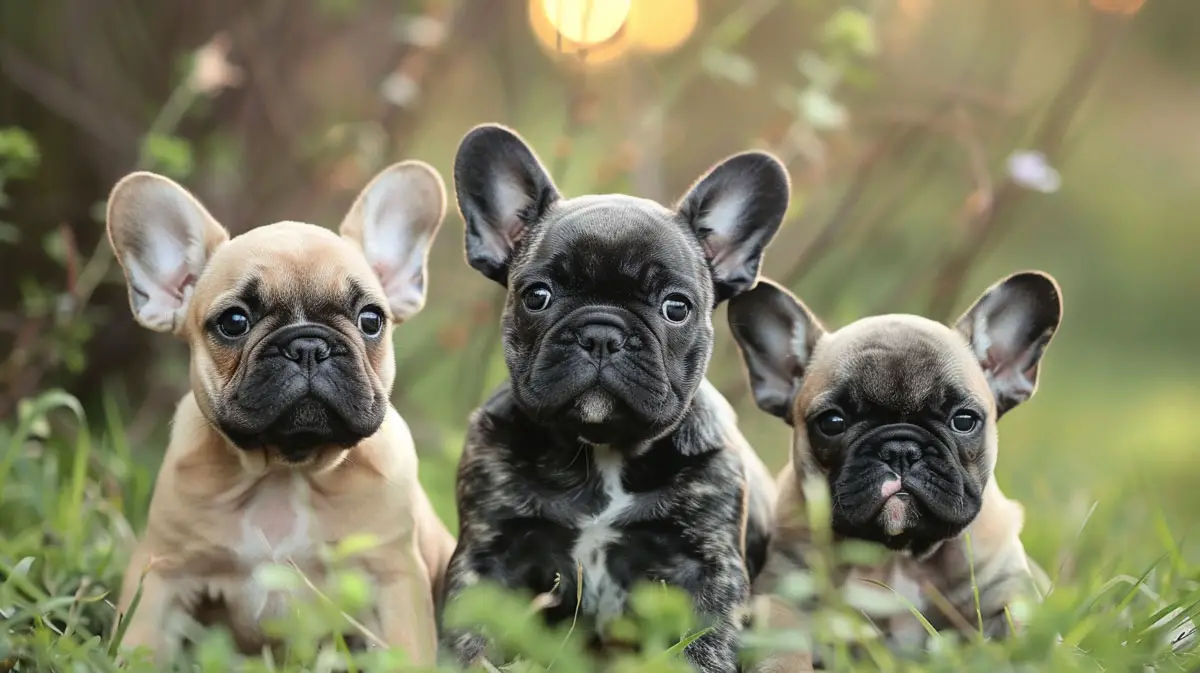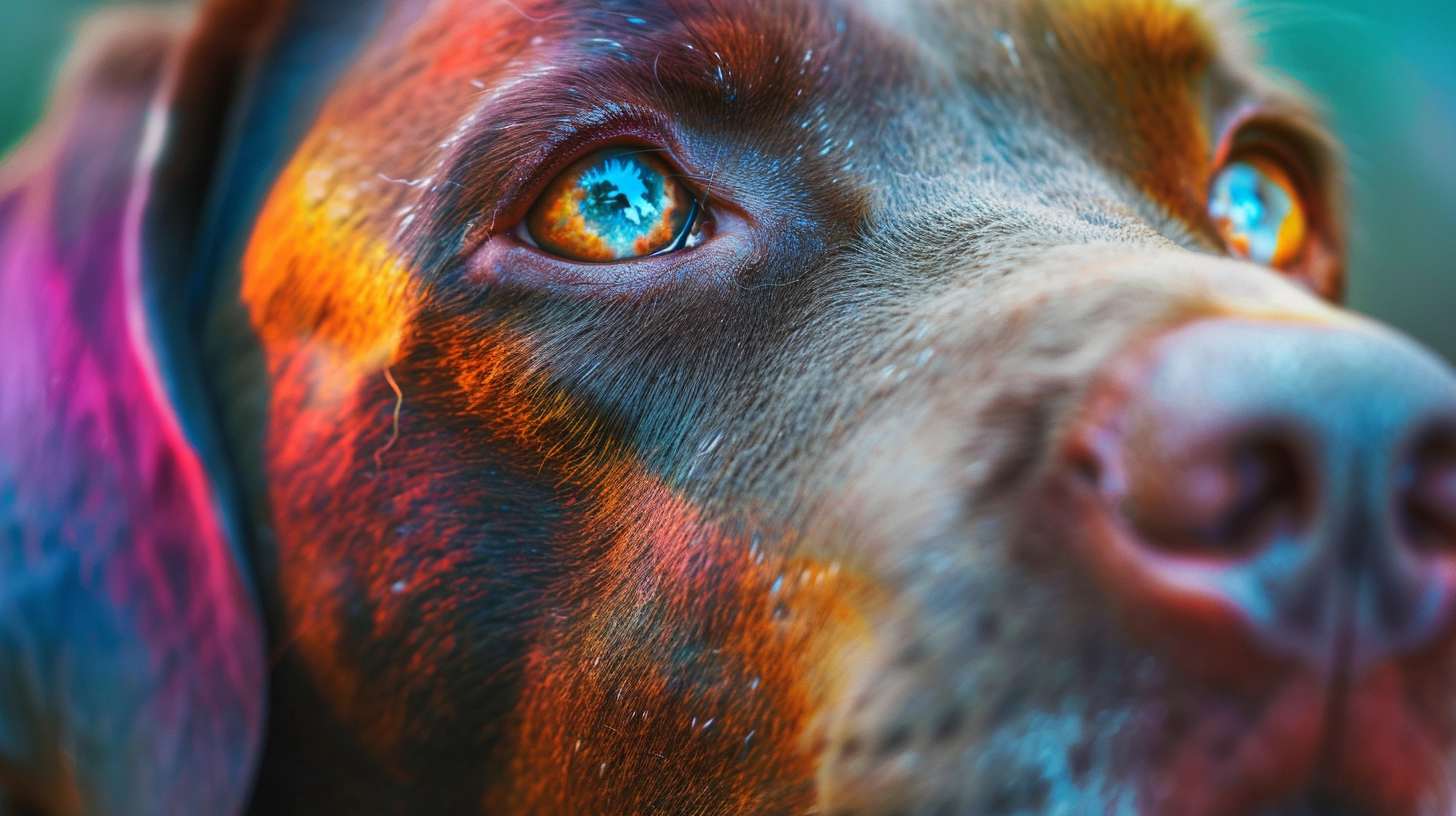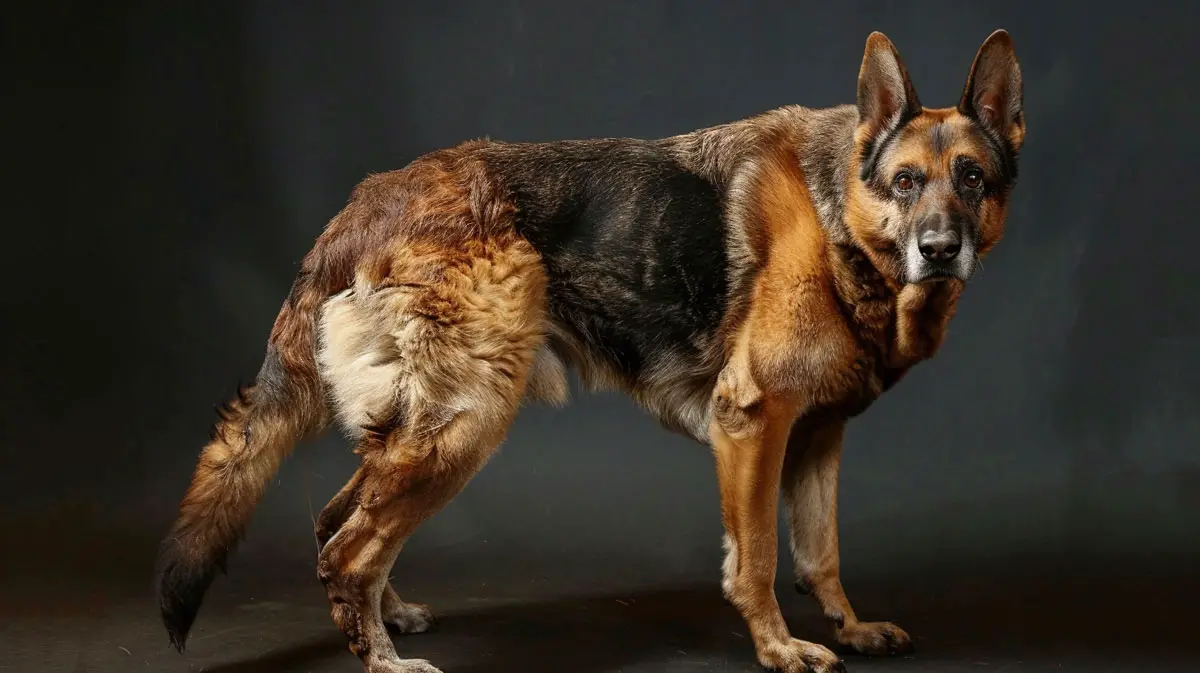Bulldogs are among the top dog breeds in the United States. They win hearts with their wrinkled faces and sweet nature. But, it’s important to know they need special care because of their unique traits and health issues.
Key Takeaways:
- Understanding the specific care requirements of Bulldogs is essential for their overall well-being.
- Feeding Bulldogs a high protein diet and providing regular exercise is crucial for their health.
- Bulldogs are prone to certain health issues, and regular veterinary check-ups are necessary to monitor their health.
- Climate considerations should be taken into account to provide a comfortable environment for Bulldogs.
- Grooming, training, and socialization are important aspects of caring for Bulldogs.
Bulldog Breeds: English Bulldog vs. French Bulldog
The English Bulldog and the French Bulldog are very popular. They’re part of the bulldog family but are quite different. Knowing these differences helps you care for your bulldog better.
English Bulldog
The English Bulldog is muscular and has a unique wrinkled face. It’s a friendly and calm breed, great as family pets. They are loyal, loving, and good with kids and pets. But, they do need regular exercise to stay healthy.
French Bulldog
French Bulldogs, or “Frenchies,” are small and compact. They’re playful and loving, perfect for anyone. They’re known for their bat-like ears and big eyes. Frenchies need less exercise, which is great for small space living.
“Both the English Bulldog and the French Bulldog are beloved breeds with their own distinctive traits. Understanding the specific characteristics and care needs of each breed is crucial for providing them with a happy and healthy life.”
Grooming is important for both breeds. Clean their wrinkles to prevent infection and brush their coats. Clean their ears and trim nails regularly, too. Regular vet check-ups are also key for both breeds.
Each breed has unique aspects. Think about your lifestyle before choosing. Both the English Bulldog and French Bulldog will bring happiness and love into your home.
| Bulldog Breeds | Distinguishing Features | Care Requirements |
|---|---|---|
| English Bulldog | Wrinkled face and stocky body | Regular exercise and grooming |
| French Bulldog | Bat ears and expressive eyes | Lower exercise requirement and regular grooming |
Knowing the differences between the English and French Bulldogs helps in choosing the right one for you. Both the muscular English Bulldog and the charming French Bulldog are great pets that will bring joy to your home.
Bulldog Care: Feeding and Exercise
Feeding and exercising your Bulldog are key to their care. They need the right food and some exercise to stay fit and happy.
Feeding:
Bulldog puppies need their meals adjusted as they grow. They should eat high protein dog food, with carbohydrates that digest slowly. This keeps their energy up and supports health. Always ask your vet for advice on feeding your Bulldog, considering their age, size, and how active they are.
Exercise:
Bulldogs are less active than some dogs, but they still need exercise. Regular, moderate activity helps them stay at a healthy weight and keeps their muscles strong. Walks and short play times are good for them. They get mental and physical exercise. But, remember Bulldogs can overheat or struggle to breathe if they work too hard.
Bulldogs have short noses which makes it hard for them to breathe sometimes. This can be worse when it’s hot or they are very active. Look out for heavy breathing or tiredness during exercise. Make sure they rest and drink water to stay safe and comfortable.
Fun Fact: Bulldogs can be funny and love to relax. They often enjoy just hanging out with their owners more than running around.
Below is a table to help you understand Bulldog’s needs for food and exercise:
| Age | Feeding Guidelines | Exercise Recommendations |
|---|---|---|
| Puppy (8 weeks – 6 months) | 3-4 small meals per day Slowly transition from puppy food to adult dog food | Play sessions indoors or in a secure fenced yard Short walks (10-15 minutes) |
| Adult (6 months – 7 years) | 2 meals per day | 30 minutes of exercise (walks, fetch, interactive play) |
| Senior (7 years and older) | 2 meals per day | Gentle walks and low-impact activities Regular veterinary check-ups for age-related health concerns |
Each Bulldog is different, and their needs for food and exercise can vary. Watching your Bulldog’s health, keeping an eye on their weight, and talking to your vet will make sure your dog gets the best care.
Bulldog Health: Common Issues and Prevention
Bulldogs are beloved for their unique look and charming ways. Yet, they face some health challenges. Knowing about these and how to prevent them helps keep Bulldogs healthy.
Eye problems are a big issue due to their bulging eyes. Conditions like cherry eye and dry eye are common. Check their eyes often and see a vet if problems arise to avoid worse issues.
Hip dysplasia affects Bulldogs too. It’s when the hip joint doesn’t form right, causing pain and movement issues. Keep them active but avoid too much strain to help.
“Regular vet visits and preventive steps like shots and keeping a healthy weight can fend off these issues and promote Bulldogs’ health.”
Skin infections are usual because of their skin folds. Moisture can get trapped, letting bacteria and yeast grow. Clean and dry those folds regularly, and use medicated wipes or sprays to prevent infections.
Respiratory distress syndrome is a risk for them due to their short noses. They can struggle with heat and exercise. Protect them from extreme heat and strain, and make sure they have a cool, airy spot.
Regular vet check-ups are crucial to keep Bulldogs healthy. Include vaccinations, fighting parasites, and dental care in their health plan. A proper diet helps avoid obesity-linked issues too.
Active care and expert advice can lead to a happy Bulldog. Always speak to your vet for advice suited to your Bulldog’s needs.
Common Health Issues in Bulldogs
| Health Issue | Description |
|---|---|
| Eye problems | Conditions like cherry eye, entropion, and dry eye can affect Bulldogs due to their prominent eyes. |
| Hip dysplasia | A malformation of the hip joint that can cause pain and difficulty in movement. |
| Skin infections | Bulldogs’ skin folds and wrinkles can trap moisture, leading to bacterial and yeast infections. |
| Respiratory distress syndrome | Bulldogs’ brachycephalic structure puts them at risk of breathing difficulties and heatstroke. |
Climate Considerations for Bulldogs
Bulldogs have a unique look with their wrinkled face and strong build. But, their special look means they need more care in extreme temperatures. It’s important to keep them in the right climate for their health.
Hot Weather
In hot weather, Bulldogs can easily get too hot or suffer from heatstroke. Don’t leave them outside too long, especially when it’s very hot. Always have water ready to keep them cool and look for a shady spot when outside.
Also, never leave Bulldogs in a car that’s parked. The car can heat up fast and put their lives at risk. In hot weather, always put your Bulldog’s health first.
Cold Weather
When it’s cold, Bulldogs may find it hard to stay warm because they have short coats. They should have warm clothes, like a sweater or jacket, for outdoor activities. This helps keep them comfortable in the cold.
Inside, make sure they have a cozy place to sleep that’s away from cold drafts. Avoid letting them be in very cold weather for too long. This can cause serious health problems like hypothermia.
If your area gets very cold winters, think about getting booties for their paws. This protects them from cold ground and road salt. Plus, it keeps them warmer. Remember, the weather affects your Bulldog’s health a lot.
Creating a Comfortable Environment
Knowing how to keep Bulldogs comfortable in different climates is key. Whether it means providing cool shade in summer or warm clothes in winter, always think about their care and health. By doing this, you’ll make sure they stay happy and healthy.
Now that you understand how to keep your Bulldog comfortable, we will talk about how grooming plays a role in their care next.
Bulldog Grooming: Tips and Techniques
Grooming your Bulldog is crucial for keeping their coat and skin healthy. We have some top tips and techniques for looking after your Bulldog’s looks and health.
Regular Brushing
Bulldogs have a short, dense coat that needs frequent brushing to shed dead hair and spread natural oils. Use a soft-bristle brush or grooming mitt. Brush gently in the direction of hair growth.
This helps remove loose hair and stimulates the skin, boosting blood flow. It also reduces the risk of matting and skin issues.
Minimal Bathing
Bathing is key for hygiene but too much can dry out your Bulldog’s skin. Bathing every 2-3 months is enough. Use mild shampoo for sensitive skin and wash off all soap to avoid irritation.
Facial Wrinkle Care
Their cute facial wrinkles need regular cleaning to avoid infections and smells. Use a damp cloth or special wipe for cleaning. Focus on the folds around the nose, mouth, and eyes to prevent dirt and bacteria buildup.
Always dry the wrinkles well to stop irritation or discomfort.
Ear Cleaning
Ear infections are common, so keep their ears clean. Clean with a cotton ball or cloth and gentle solution. Don’t go deep into the ear. This prevents wax buildup and infections, keeping ears healthy.
Professional Grooming
Consider professional grooming for your Bulldog. Professional groomers are skilled in handling Bulldogs. They take care of nails, ears, and coat, keeping your Bulldog in top shape.
Grooming Summary
Bulldog grooming needs regular care. Follow our tips for brushing, bathing, and cleaning to keep your Bulldog looking and feeling great. Regular care promotes health and hygiene.
Training and Socialization for Bulldogs
Bulldogs are smart and loyal friends. They need regular training and socialization early on. This helps them show their best traits.
For Bulldog training, positive reinforcement works well. Reward them with treats, praise, and love for good behavior. They do great with encouragement and not punishment.
Remember, Bulldogs can be headstrong. Training them may test your patience. Being consistent is crucial. Everyone at home should follow the same training steps to avoid confusion.
Socializing your Bulldog is key. Take them to different places and meet various people and animals. It makes them confident and well-mannered.
Socializing Bulldogs with other dogs:
Start socializing your Bulldog with other dogs in a calm and neutral place. As they get comfy, you can allow more complex interactions. Watch them play to make sure they’re having fun and not getting upset. Learning to socialize early prevents bad behavior later.
The saying “You can’t teach an old dog new tricks” is not true for Bulldogs. With patience and positive reinforcement, Bulldogs can learn at any age. Training isn’t just a one-time thing. It takes time and love, but the effort pays off.
Training and socializing your Bulldog is important. With your time and work, you can guide their behavior. The process may be tough, but with patience and love, you’ll enjoy a well-behaved friend.
| Training Tips for Bulldogs | Socialization Tips for Bulldogs |
|---|---|
| Use positive reinforcement techniques | Expose them to various people and environments |
| Be patient and consistent | Gradually introduce them to other dogs |
| Set clear rules and boundaries | Supervise playtime with other dogs |
| Involve the whole household in training | Address any signs of discomfort or aggression |

Bulldog Toys and Enrichment
Keeping your Bulldog happy and sharp is very important. They love to play and explore. The right toys and activities can help them stay sharp and active.
Bulldogs love toys that make them think and move. A favorite is the Kong toy. It’s tough and you can fill it with treats. They have to figure out how to get to the treat, which is fun for them.
For Bulldog puppies, even a knotted sock can be fun. It feels interesting and helps with their need to chew. Always watch your puppy when they play with things like socks.
Puzzle toys and toys that give out treats are great too. They make your Bulldog solve problems to get treats. This keeps their brain working and keeps them entertained.
“Toys and enrichment activities play an important role in keeping Bulldogs mentally stimulated and preventing boredom.”
Change your Bulldog’s toys often to keep things new. This stops them from getting bored. Always watch them play to keep them safe.
Choose toys that are safe and strong for Bulldogs. Stay away from toys with small, easy-to-chew-off parts. Pick toys made with safe materials and check them for damage often.
Try scent games or hide treats for more fun. These games make them use their senses and instincts to find treats. It’s a good way to keep their mind sharp.
Bulldog Bedding and Comfort
Bulldogs need a cozy spot to rest and sleep, just like other dogs. The right bedding is key to their health and happiness. This makes them feel comfortable and contributes to their overall well-being.
It’s crucial to think about their health when choosing bedding. Bulldogs may suffer from joint issues. Supportive bedding can ease their discomfort and improve sleep quality.
Cotton rugs are a good choice for them. They’re soft yet strong, offering a comfy place for Bulldogs to lie. Plus, they’re easy to clean, helping you keep things hygienic.
Blankets also work well for Bulldog bedding. Choose blankets that are soft and allow air to pass through. This keeps Bulldogs warm without overheating them, supporting their health.
Fake sheepskin rugs are favored by many Bulldog owners. They’re soft like real sheepskin but easier to take care of. They’re kind to Bulldog’s skin and offer a cozy spot for resting.
It’s important to clean Bulldog bedding regularly. This prevents dust, dirt, and allergens from gathering. Especially for Bulldogs with allergies, clean bedding means a healthier sleep space.
By choosing the right bedding, you help ensure your Bulldog sleeps well. A relaxed Bulldog is a happy one, which makes your bond even stronger.

Exercise and Activity for Bulldogs
Bulldogs may not be as energetic as other dogs, but they still need regular exercise. This keeps them healthy and sharp. Physical activities help prevent obesity, ensuring they stay in good shape.
Short walks keep Bulldogs active without wearing them out. Walk them regularly during the day for their needed exercise. Also, playing fetch is a fun way to get them moving and engaged.
“Regular exercise helps Bulldogs maintain a healthy weight, strengthens their muscles, and supports cardiovascular health,” says Dr. Lisa Thompson, a veterinarian specializing in Bulldog care.
Playtime is key for Bulldogs. Find activities that suit their energy and what they like to do. This can be with toys or games that make them think and solve problems.
Benefits of Exercise for Bulldogs
- Bulldog health: Exercise keeps their weight healthy, boosts heart health, and builds stronger muscles.
- Bulldog temperament: Staying active can reduce behavioral issues and improve their mental health.
- Bulldog care: Regular physical activity keeps your Bulldog fit and happy.
Exercise for Bulldogs should match what they can do. Watch how they’re doing and adjust how much and how hard they exercise. Make sure they’re active but not too tired.
Regular exercise and activities not only improve your Bulldog’s health but also their mind. It makes your bond with them even stronger.
| Exercise Types | Description |
|---|---|
| Short Walks | Take your Bulldog for regular short walks throughout the day to keep them physically active. |
| Rounds of Fetch | Engage in rounds of fetch to encourage running and movement while having fun with your Bulldog. |
| Interactive Play Sessions | Participate in activities that match your Bulldog’s energy levels and preferences, such as playing with interactive toys or mentally stimulating games. |
Conclusion
Caring for a Bulldog means knowing what makes them special. They need good food, exercise, grooming, and visits to the vet. Bulldogs stand out for their looks and friendly nature. They are great for both families and single people.
To keep a Bulldog healthy, pay attention to their diet and exercise. Pick food that meets their needs. Make sure they move enough to stay at a good weight. Grooming them regularly keeps their coat and skin healthy.
Also, Bulldogs should see the vet often. This keeps them up to date on shots and catches health issues early. By doing these things, your Bulldog can have a long, happy life.
Having a Bulldog is a big job. But, by following these tips, you can take good care of them. This will help you build a lasting bond with your Bulldog.





Leave a Reply